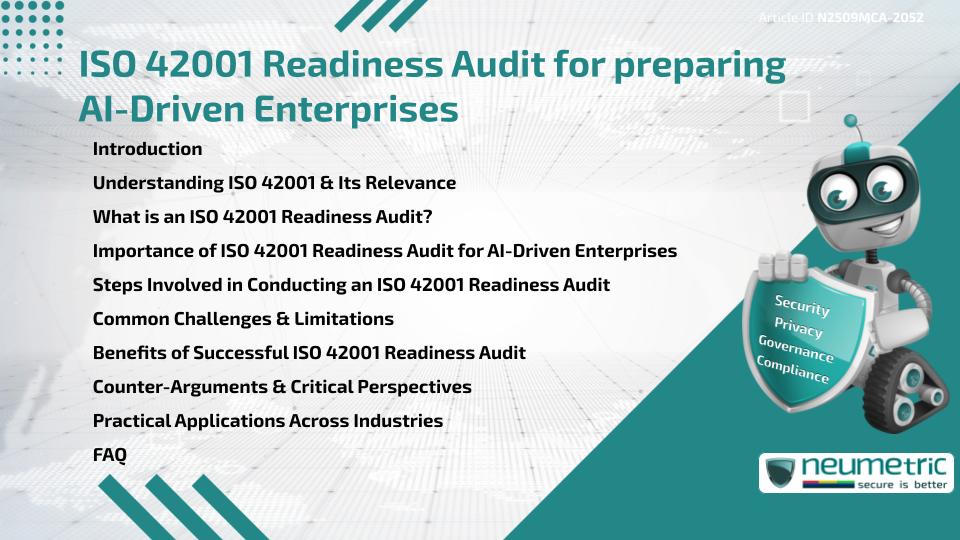Table of Contents
ToggleIntroduction
An ISO 42001 Readiness Audit is a structured process that evaluates whether an Enterprise is prepared to comply with ISO 42001, the International Standard for Artificial Intelligence [AI] Management Systems. For AI-driven Enterprises, this Audit ensures Governance, Ethical Considerations, Risk Controls & Regulatory Compliance are aligned with Global Benchmarks. It not only highlights Gaps but also provides practical guidance for improving AI Practices. By completing a Readiness Audit, Enterprises can streamline Certification efforts, strengthen Stakeholder Confidence & mitigate the Risks associated with AI Deployment.
Understanding ISO 42001 & Its Relevance
ISO 42001 is a Standard designed to provide guidance for managing AI responsibly. It emphasizes principles such as Transparency, Fairness, Accountability & Data Integrity. For Enterprises where AI drives business decisions, compliance with ISO 42001 helps maintain ethical practices while meeting legal requirements. The Readiness Audit acts as a preparatory checkpoint, allowing businesses to measure their maturity before certification.
What is an ISO 42001 Readiness Audit?
An ISO 42001 Readiness Audit is an Internal or Third Party review that benchmarks an Enterprise’s AI Governance Framework against the requirements of ISO 42001. Unlike a full Certification Audit, it is diagnostic rather than judgmental. Think of it as a rehearsal before the main performance, helping Organisations understand what examiners will expect.
Importance of ISO 42001 Readiness Audit for AI-Driven Enterprises
AI-driven Enterprises often work with Sensitive Data & automated decision-making systems. Without structured Governance, these systems may introduce Risks such as Bias, Opacity or Regulatory Violations. The Readiness Audit helps address:
- Data Governance & Privacy Controls
- Risk identification & mitigation processes
- Ethical AI Deployment Frameworks
- Compliance with Regional & International Laws
Conducting this Audit demonstrates accountability to Stakeholders & regulators, ensuring AI Systems are safe, transparent & trustworthy.
Steps Involved in Conducting an ISO 42001 Readiness Audit
A Readiness Audit typically involves the following stages:
- Pre-Assessment – Reviewing organizational goals & existing AI processes.
- Gap Audit – Comparing current implementation against the ISO 42001 requirements.
- Documentation review – Checking Policies, Procedures & Records.
- Interviews & workshops – Engaging Stakeholders for clarity & alignment.
- Audit reporting – Summarizing Findings, Faps & Corrective Actions.
This structured approach ensures Enterprises have a clear Roadmap before seeking Certification.
Common Challenges & Limitations
Enterprises may face several difficulties during the Audit, including:
- Lack of clarity in translating ISO requirements into technical processes
- Resistance from teams unfamiliar with Compliance Frameworks
- Resource constraints in smaller Organisations
- Rapid changes in AI Technologies that outpace formal Governance
Acknowledging these limitations helps Organisations plan realistic timelines for Audit Readiness.
Benefits of Successful ISO 42001 Readiness Audit
Completing a Readiness Audit offers tangible benefits:
- Increased confidence in AI Systems among Stakeholders
- Streamlined Certification Process with fewer Non-Conformities
- Enhanced Risk Management & Ethical Compliance
- Improved reputation & competitive advantage
Just as a dress rehearsal ensures smoother stage performance, Readiness Audits prepare Enterprises for Certification success.
Counter-Arguments & Critical Perspectives
Some critics argue that Readiness Audits may create unnecessary administrative overhead, particularly for start-ups or smaller Enterprises. They suggest that innovation could slow down under strict Governance Frameworks. However, the counterpoint is that unchecked AI Development poses greater Risks, including Reputational Damage & Regulatory Penalties. Thus, Readiness Audits balance innovation with responsibility.
Practical Applications Across Industries
An ISO 42001 Readiness Audit applies across diverse industries where AI plays a key role:
- Healthcare – Ensuring Patient Data Protection & ethical AI diagnostics.
- Finance – Managing Algorithmic Trading Risks & preventing Bias in lending.
- Retail – Enhancing Customer Personalisation while maintaining Transparency.
- Manufacturing – Safeguarding automated processes & predictive analytics.
Each sector benefits differently, but the overarching theme is trustworthy AI adoption.
Takeaways
- An ISO 42001 Readiness Audit is a vital step for AI-driven Enterprises seeking compliance & ethical alignment.
- The Audit helps identify gaps before certification, reducing Risks & inefficiencies.
- While challenges exist, the long-term benefits outweigh the initial effort.
- Readiness Audits strengthen trust & ensure Enterprises remain competitive in AI-driven markets.
FAQ
What is the purpose of an ISO 42001 Readiness Audit?
It helps Organisations evaluate their compliance with ISO 42001 requirements before pursuing certification.
How is an ISO 42001 Readiness Audit different from a Certification Audit?
A Readiness Audit is diagnostic & advisory, while a Certification Audit is conclusive & determines compliance.
Who should conduct an ISO 42001 Readiness Audit?
It can be performed internally by trained teams or externally by independent Auditors specialising in AI Governance.
How often should AI-driven Enterprises perform Readiness Audits?
Most Organisations benefit from conducting Audits annually or before significant AI Deployments.
What challenges might Organisations face in Readiness Audits?
Common challenges include resource limitations, unclear Policies & rapidly evolving AI technologies.
Do small Enterprises also need an ISO 42001 Readiness Audit?
Yes, though scaled to their size, as it helps establish responsible AI Practices early on.
What industries benefit most from Readiness Audits?
Healthcare, Finance, retail & Manufacturing industries often gain the most due to heavy reliance on AI Systems.
References
Need help for Security, Privacy, Governance & VAPT?
Neumetric provides organisations the necessary help to achieve their Cybersecurity, Compliance, Governance, Privacy, Certifications & Pentesting needs.
Organisations & Businesses, specifically those which provide SaaS & AI Solutions in the Fintech, BFSI & other regulated sectors, usually need a Cybersecurity Partner for meeting & maintaining the ongoing Security & Privacy needs & requirements of their Enterprise Clients & Privacy conscious Customers.
SOC 2, ISO 27001, ISO 42001, NIST, HIPAA, HECVAT, EU GDPR are some of the Frameworks that are served by Fusion – a SaaS, multimodular, multitenant, centralised, automated, Cybersecurity & Compliance Management system.
Neumetric also provides Expert Services for technical security which covers VAPT for Web Applications, APIs, iOS & Android Mobile Apps, Security Testing for AWS & other Cloud Environments & Cloud Infrastructure & other similar scopes.
Reach out to us by Email or filling out the Contact Form…


